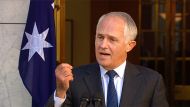- Turnbull to abolish 457 immigration visas
- Restaurants say 457 visas a key to success
- 'Spin over substance,' unions say
- Comment: The big hole in Turnbull's plan
The impression some will take from Malcolm Turnbull's surprise "abolition" of 457 visas, and his jingoistic "Aussies first" rhetoric justifying it, is that the nation really is under siege by marauding foreigners.
More BusinessDay Videos
457 visas: PM's Australia-first rhetoric
The decision to abolish 457 temporary work visas is presented by Malcolm Turnbull as putting the interests of Australians first.
Others will see a government succumbing to Hansonism and that, rhetorically at least, Turnbull has darted for the panic room of Australian politics – the nativist refuge of a little Australia.
That this is "press release politics" is proved by the fact the details – such as they are available – tell a more nuanced story than that imparted by the bombshell headline. If the idea was merely to tighten the skilled migration criteria and toughen its tests, then why change the name? The answer is self-evident: to maximise the political impact.
In any event, the two dimensions - the political and policy - are not mutually exclusive, because the scheme, as configured, is far from perfect.
Still, it was the politics that drove this action now as Turnbull was bleeding support, gored by a populist Bill Shorten in his left flank and by Pauline Hanson's openly xenophobic One Nation on his Nationals party right.
It was John Howard who introduced the 457 skilled migration visa class to increase the labour supply and, crucially, to contain wage pressures.
It worked too, but as the greatest resources boom in our history increasingly sucked trades from manufacturing, construction and other sectors, non-mining sectors faced their own shortages and the pressure for a wider array of importable occupations grew to 650.

Turnbull is right when he invokes Howard's formula that public confidence in the immigration system is a foundation of multicultural success. And he's correct when he concludes that public confidence has been on the slide because of this program's abuse and mismanagement – although this announcement will probably hasten that decline in confidence, and is an admission of departmental failure.
With unemployment running officially at 5.9 per cent and underemployment widespread, people do need to believe the skilled-labour program is reasonable and appropriately targeted, and that it is being rigorously administered. The abuse of 457 class visas by some employers and their use for what are essentially unskilled or low-skilled jobs, such as burger-flipping, have not helped.

But as the US simultaneously moves to curtail foreign workers, the sense of a corresponding trend in Australia is palpable.
More evidence of the Trump effect.















68 comments
Comment are now closed